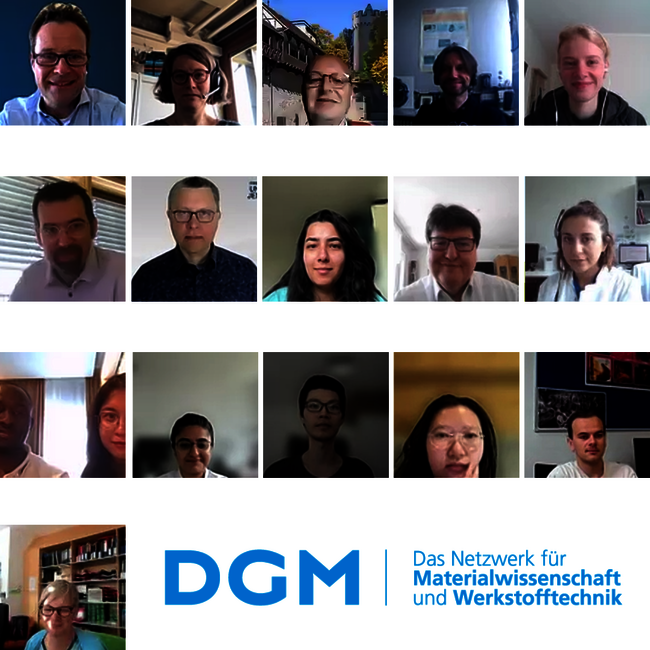On 13 June, 25 experts met at the 10th meeting of the DGM Biomaterials Expert Committee to discuss the latest advances in the field of antimicrobial and antiviral biomaterials. The meeting, which was held online, started at 9:00 a.m. with a presentation of the DGM and its activities by DGM Managing Director Dr. Stefan Klein, followed by a brief introduction of the Biomaterials Expert Committee by Committee Chair Prof. Dr. Klaus D. Jandt from Friedrich Schiller University Jena.
The morning started with a block of lectures in which Prof. Dr. Jandt presented the new DFG Research Training Group (RTG) 2723 "Material-Microbe-Microenvironments (M-M-M)". The aim of the new Research Training Group is to research new antimicrobial biomaterials based primarily on physical principles and to train interdisciplinary experts in the field of antimicrobial biomaterials. Katharina Siems (M.Sc.) from the German Aerospace Center (DLR) in Cologne then reported on research into biofilms on material surfaces on the International Space Station (ISS) ("Biofilms in Space"). Biofilms behave differently in weightlessness than under normal gravity conditions and can also pose a challenge to the internal components of the ISS.
A short coffee break was followed by a tandem presentation by two PhD students of RTG 2723, Zhaorui Jin (M.Sc.) and Bolaji J. Samuel (M.Sc.). Their presentation focused on bioactive glasses used to treat traumatic or pathological bone defects. These glasses offer promising applications in regenerative medicine as their bioactive properties can support bone healing.
Prof. Dr. Andrey Turchanin from FSU Jena then presented a sensitive graphene membrane-based sensor for the detection of viruses. Further possibilities of biofunctional interfaces based on carbon 2D materials were presented and discussed in this interesting lecture.
Finally, PD Dr. Thomas F. Keller from DESY-Hamburg reported on new ways to effectively deactivate viruses on titanium oxide. UV radiation can be used for this purpose. Dr. Keller's talk highlighted the importance of a thorough materials science characterization of these systems to advance the understanding of the mechanisms of action.
Prof. Jandt concluded by emphasizing the pleasing and very large turnout of mostly young scientists attending a DGM Technical Committee meeting for the first time. The event provided an opportunity to discuss the latest developments and research results in one of the most dynamic areas of materials science. It emphasized the importance of interdisciplinary collaboration and the continuous search for innovative solutions to combat microbial and viral threats.
Information on all expert committees can be found on the DGM website at https://dgm.de/en/network.
If you are interested in becoming an active member of one of the committees, please send a short email to fachgremiendgm.de.
![[Translate to English:]](/fileadmin/_processed_/f/0/csm_logodgm-4_b2722eeace.png)
![[Translate to English:]](/fileadmin/user_upload/logodgm-4.png)
